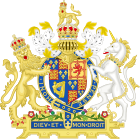Observance of 5th November Act 1605 facts for kids
| Act of Parliament | |

|
|
| Long title | An act for a publick thanksgiving to Almighty God every year on the fifth day of November. |
|---|---|
| Citation | 3 Jas. 1. c. 1 |
| Introduced by | Edward Montagu |
| Dates | |
| Repealed | 25 March 1859 |
| Other legislation | |
| Repealed by | Anniversary Days Observance Act 1859 |
|
Status: Repealed
|
|
| Text of statute as originally enacted | |
The Observance of 5th November Act 1605 was a special law. It was also called the Thanksgiving Act. The Parliament of England passed this law in 1606. This happened right after the famous Gunpowder Plot.
A politician named Edward Montagu suggested this law. He introduced the idea on January 23, 1606. The law asked for a yearly public celebration. This was to give thanks that the Gunpowder Plot failed.
The Act said that church leaders had to hold a special service. This service would happen every year on November 5th. During the service, the words of the Act itself had to be read aloud. Everyone was expected to attend and behave well. The law stayed in effect for a very long time, until 1859.
Contents
Why the Act Was Made
The beginning of the Act explained why it was needed. It talked about a terrible plan. Some people wanted to blow up the Parliament building. This was planned for November 5, 1605. The King, Queen, Prince, and all the important leaders would be there.
The Act said this plan was "inhuman, barbarous and cruel." Nothing like it had ever been heard of before. The people behind the plot wanted to destroy the place. This was where important laws were made. They called these laws "Cruel Laws" against their religion.
The Act explained that God helped the King. The King understood a secret message. This helped him discover the plot. It was found out just hours before it was supposed to happen. This saved the whole kingdom from ruin.
The main reason for the Act was to remember this day. It wanted people to always be thankful. It was a "joyful Day of Deliverance."
What the Act Required
The Act had clear rules for everyone.
Church Services
It said that church leaders in every church had to do something special. On November 5th, they had to say "Morning Prayer." They also had to "give unto Almighty God Thanks." This was for the "most happy Deliverance."
During this service, the church leader had to read the Act. They had to read it "publickly, distinctly and plainly." This meant everyone could hear and understand it.
Attending Church
All people were told to go to their local church. They had to go on November 5th. They were also told to "abide orderly and soberly." This meant they should stay calm and respectful. They had to do this during all the prayers and services.
Giving Warning
Every church leader also had another job. They had to tell their church members about the service. They had to give a public warning. This warning had to be given in church. It was to be done during morning prayer on the Sunday before November 5th.
The Act did not say what would happen if someone did not follow these rules. There were no punishments listed.
How the Act Influenced Others
The Observance of 5th November Act 1605 was very important. It was one of the first laws of its kind. It was a law that asked people to remember a historical event.
This Act became a model for other laws. Later, similar laws were made. These laws asked people to remember other important events. For example, they commemorated events like the Virginian massacre in 1622. They also remembered the Irish Rebellion of 1641 and the execution of Charles I. Another event was the return of the King in 1660.
When the Act Ended
This law stayed in place for a very long time. But on March 25, 1859, it was removed. Another law called the Anniversary Days Observance Act 1859 ended it.
See also
 | Anna J. Cooper |
 | Mary McLeod Bethune |
 | Lillie Mae Bradford |

